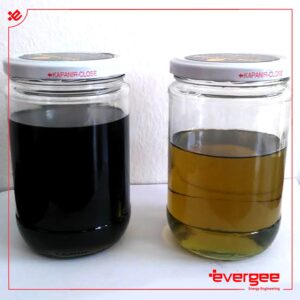Fuel Polishing System

Diesel fuel with its low sulfur and biodiesel additive is susceptible to physical and biological contamination, especially when stored for medium to long durations, particularly in the case of generators. If not controlled and the fuel undergoes continuous neglect in terms of maintenance, the inevitable consequence can be the generators failing to operate when needed or causing expensive repairs. In facilities where downtime is intolerable due to commercial, vital, or national security risks, this situation is of paramount importance and should not be overlooked.
Fuel polishing systems, designed to maintain continuous maintenance cycles for fuel during prolonged storage, ensure that the diesel is protected within the specifications it left the refinery. A properly designed fuel polishing system should:
- Neutralize microorganisms
- Clean ferrous agents
- Separate water in both free and emulsified states in different stages
- Gradually clean solid particles in the fuel at a level of at least 2 microns (absolute)
- Be designed and manufactured to automatically dose chemical agents when needed
Fuel polishing systems should not contain yellow metals and their alloys at any point in the diesel system due to the known adverse interactions and oxidation risk. A well-designed fuel polishing device guarantees the continuous protection of fuel in accordance with ASTM D975 and EN590 standards, preventing all fuel-related downtime risks.
Fuel polishing systems are designed to clean and maintain the quality of stored fuels, including diesel, gasoline, and other petroleum-based fuels. These systems are commonly used in various industries where fuel quality is critical, such as backup power generation, marine vessels, construction equipment, and transportation fleets. Here’s an overview of fuel polishing systems:
- Filtration Units: Fuel polishing systems typically include multiple stages of filtration to remove particulate matter, water, and other contaminants from the fuel. These filters are designed to capture impurities of various sizes to ensure clean fuel delivery to engines.
- Water Separators: Water is a common contaminant in stored fuel, primarily due to condensation, leaks, or improper storage. Fuel polishing systems often incorporate water separators or coalescers to remove water from the fuel, preventing issues such as microbial growth, corrosion, and injector damage.
- Fuel Circulation and Cleaning: Fuel polishing systems continuously circulate the stored fuel through filtration units, effectively cleaning the fuel and maintaining its quality. This process helps prevent fuel degradation over time and ensures that the fuel remains suitable for use.
- Microbial Growth Prevention: Some fuel polishing systems use biocides or fuel additives to prevent the growth of microorganisms like bacteria and fungi in the fuel. Microbial contamination can lead to fuel degradation, clogged filters, and engine problems.
- Monitoring and Control: Advanced fuel polishing systems may include sensors, monitors, and control panels to monitor fuel quality, flow rates, pressure, and other parameters. This allows operators to detect issues early, optimize system performance, and take corrective actions as needed.
- Remote Monitoring and Alarm Systems: Many fuel polishing systems offer remote monitoring capabilities, allowing operators to monitor system status, receive alerts, and access diagnostic information remotely. This ensures that any issues with fuel quality or system operation can be addressed promptly, even if personnel are not on-site.
- Integration with Fuel Tanks: Fuel polishing systems can be integrated into existing fuel storage tanks or installed as standalone units, depending on the specific requirements of the application. They are often designed to be compact, efficient, and easy to install and maintain.
Overall, fuel polishing systems play a crucial role in maintaining the quality and reliability of stored fuels, ensuring that engines and equipment operate smoothly and efficiently when needed. By removing impurities, water, and microbial contaminants, these systems help prevent fuel-related issues, extend equipment life, and reduce maintenance costs.

